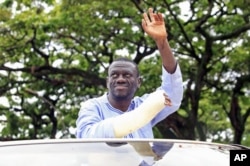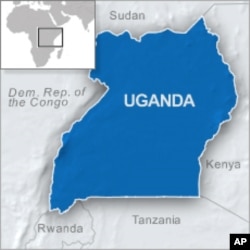Hundreds of Ugandan lawyers gathered around court premises across the country Wednesday to protest the government's crackdown on food and fuel price demonstrations that have engulfed the country over the past three weeks.
The Uganda Law Society alleges the police and other security agencies have committed “crimes against humanity” against protestors.
The lawyers have vowed to boycott all court proceedings across the country until the end of the week, to show support for the demonstrators’ constitutional rights.
Early Wednesday, as part of the strike, the lawyers presented a petition to the High Court in Kampala expressing their concern about what they called the subversion of the rule of law.
“We were received very well by the chief justice,” said Bruce Kyerere, the president of the Uganda Law Society. “We peacefully and in a very dignified manner assembled at the precincts of the High Court,” he added.
There was heavy police presence at the court premises as the lawyers presented the petition, but the law society president said the police did not try to interfere.
The lawyers hope to draw attention to a matter of concern to all Ugandans, Kyerere said. “We were also delivering a message by petitioning the chief justice to address the subversion of the rule of law and the wanton abuse of human rights.”
He said they also asked the chief justice to address what the opposition says is state interference with the independence of the judiciary.
This “was apparent in the happenings of the last three weeks,” he said, in reference to government's crackdown on food and fuel price demonstrators across the country.
The lawyers are asking the judiciary “to re-examine yourself, re-invent yourself,” said Kyerere, and not to “go the way the executive and the legislature have gone.”
Keyerere said they asked the chief justice, whom he described as the only remaining voice of reason, to facilitate and initiate dialogue because, he said, the parliament no longer enjoys the confidence of the public.
The law society president was optimistic. “I can see signs that our concerns will be addressed,” he said. “The chief justice has agreed to look into our grievances by assessing what has been happening in their institution [judiciary].”
They have also agreed, Kyeyere added, “to contact the powers that be by initiating a forum for the institutions of [the government that maintain] law and order....”
In March 2007, judges and magistrates went on a one-week strike when opposition leader Kizza Besigye and other opposition members were re-arrested. They had been freed on bail, after being charged with treason.





